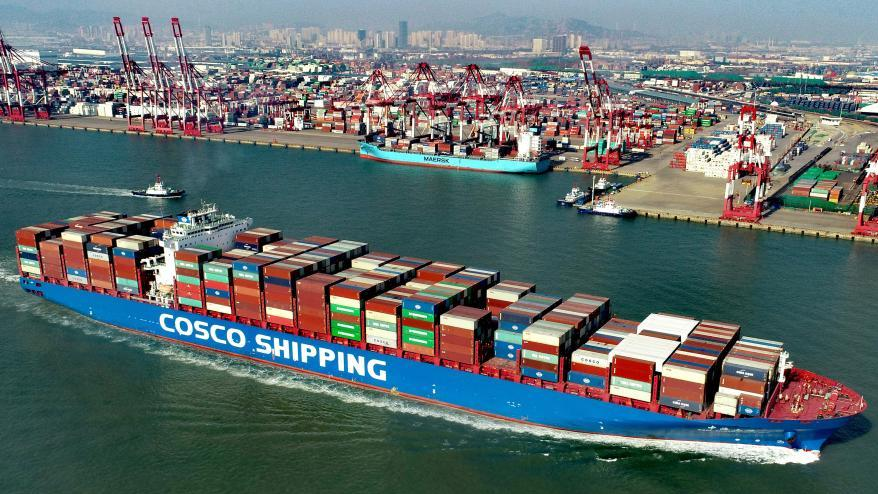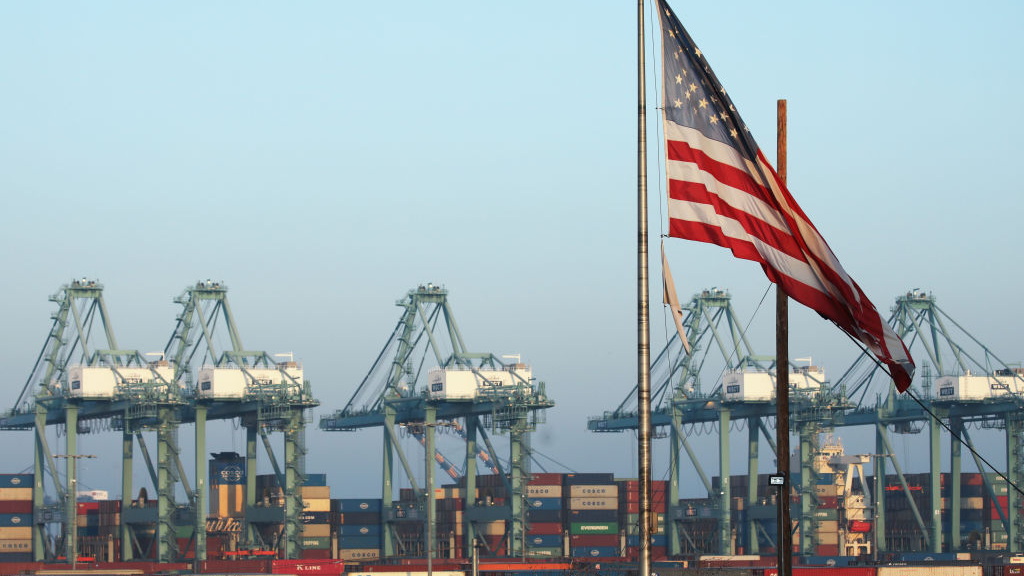
A cargo ship pulling out at Qianwan Container Terminal in Qingdao, east China's Shandong Province, February 19, 2021. /Xinhua
A cargo ship pulling out at Qianwan Container Terminal in Qingdao, east China's Shandong Province, February 19, 2021. /Xinhua
Editor's note: Jordan Kronen, a Schwarzman Scholars alumnus at Tsinghua University, serves as legislative assistant to Washington State Senator Liz Lovelett. Sumesh Shiwakoty, a policy analyst and commentator, serves as a board member and South Asia director for the U.S. Department of State-funded California-based non-profit "United by Love" and has worked in the past with the World Policy Institute in New York. The article reflects the authors' opinions and not necessarily the views of CGTN.
When U.S. President Joe Biden entered the Oval Office, the trade war between the U.S. and China was at its height. While senior officials within the Biden administration have stated that former President Donald Trump's tariffs on China were not "very thoughtful," they have done nothing so far to change the structure of these tariffs and have not engaged with their Chinese counterparts to bring ongoing tariff regimes to an end.
When Trump embarked on his ill-conceived trade war with China, he aimed to deliver on two signature campaign promises: reduce the U.S. trade deficit and bring manufacturing jobs back home.
The trade war, so far, has achieved neither of these goals. Recent evidence shows that the U.S. trade deficit with China has, in fact, continued to soar while U.S. consumers are footing the tariff bill. It has been estimated that U.S. consumers are paying $1,277 more on average annually due to the ongoing tariff regimes.
In 2019, the U.S. trade deficit with China did initially decrease as a result of tariffs, but the U.S. trade deficit with its other trading partners such as the EU, Japan and Mexico increased, demonstrating that the tariffs diverted trade flows away from China but did not solve the structural problems with the U.S. trade deficit.
Instead, Trump's tariffs on China created harm rather than prosperity. Tensions rose between U.S. companies and their Chinese contractors as well as significant increases in the prices of Chinese imported goods for U.S. markets. While conventional wisdom would interpret these economic indicators as proof that manufacturing plants are coming back to America, the facts do not support this forecast.
Data shows that U.S. companies are instead switching from Chinese suppliers to those in other countries to avoid these tariffs. Importing less from China has also hurt the U.S.'s economic health. Evidence shows that Chinese products sell three to six times the factory price in U.S. markets, allowing U.S. traders and businesses to make more money from Chinese imports than Chinese manufacturers.
A recent study by the Federal Reserve Bank of New York and Columbia University discovered that the ongoing trade war has cost U.S. companies at least $1.7 trillion.
U.S. workers and farmers have also been severely hurt by the ongoing trade war. Oxford Economics estimates that there were around 245,000 jobs lost in America at the peak of the trade war. Model simulations by that same study also suggest that any further escalation between the world's two largest economies may cause 320,000 further job losses in the U.S. and could shave almost $1.6 trillion from the U.S.'s GDP.

The Port of Los Angeles, the U.S.'s busiest container port, in San Pedro, California, November 7, 2019. /Getty
The Port of Los Angeles, the U.S.'s busiest container port, in San Pedro, California, November 7, 2019. /Getty
A spokesperson for the American Farm Bureau said that American farmers have lost, "what was once a $24 billion market in China," due to trade wars. Meanwhile, studies have shown that U.S. importers are absorbing more than 90 percent of U.S. tariff costs on Chinese goods while U.S. exporters are bearing most of the Chinese tariff costs as well.
In January 2020, when the Trump administration convinced China to buy an additional $200 billion in American goods above 2017 levels, by the end of 2021, little did they know they were just months away from a global pandemic. The pandemic motivated Americans to import from China at a record high, despite the tariffs.
Further, with $1.9 trillion coming from the American Rescue Plan Act (ARPA), it has been estimated that American consumers will import an additional $30 billion from China.
Hence, in a globalized economy, countries buy according to their need, making Trump's fixation on bilateral trade a recipe for failure. Various countries tried such an approach in the 20th century. For those of us who have read the history books, we know all too well that such economic nationalism deepened and prolonged the Great Depression.
While free trade is far from perfect, and will, if unaddressed, cause harm to some constituencies, it is the job of policymakers to recognize those constituencies and enact policies to ensure that no one is left behind.
The trade war seems to have been a lose-lose proposition not just for the U.S. and China, but for the global community. Illustrating this point is a recent report by the United Nations Development Programme which estimated that the ongoing trade war between the U.S. and China has undermined around three to five years' worth of growth among global value chains in affected countries.
Although we don't have enough reliable data to compare whether the U.S. or China has suffered more, it is all but certain that retaliatory tariffs have caused economic pain to both parties. It appears that no one has won, and that, in the end, everyone inevitably loses from these types of egocentric trade wars that are incongruent in a globally structured economy.
As global powers, both the U.S. and China have a moral obligation to work toward solutions that not only serve as win-wins for their countries, but also for the entire world. Recent scholarship has suggested that the ongoing trade war between the U.S. and China has adversely affected the global economy by disrupting global supply chains, increasing companies' financing costs due to market volatility, and caused a decline in business investment because of policy uncertainty.
The global economy is already in dire straits due to the COVID-19 pandemic, and people in poor, developing countries are the hardest hit. It would be immoral to further distort the global economy by continuing to impose detrimental policies like this trade war that has benefited no one and has harmed many.
Since the ongoing tariff regime has harshly hurt U.S. companies, in recent days, influential U.S. business groups, from microchip manufacturers to the pharmaceutical industry, are urging the Biden administration to resume trade talks with China.
The U.S. and China should heed this pressure and resume trade talks immediately to end the ongoing tariff regime, remove these self-imposed hurdles, and assume moral leadership to steer the global economy out from this recession.
(If you want to contribute and have specific expertise, please contact us at opinions@cgtn.com.)

